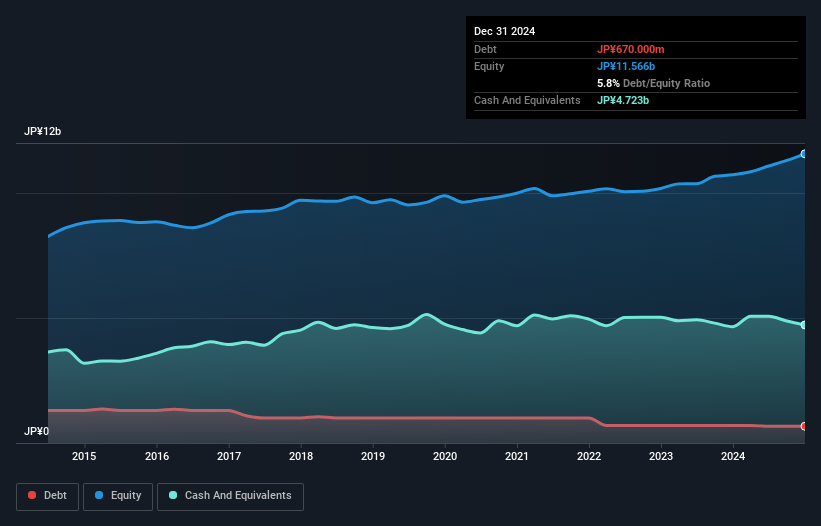- Japan
- /
- Basic Materials
- /
- TSE:5268
These 4 Measures Indicate That Asahi Concrete Works (TSE:5268) Is Using Debt Safely
Warren Buffett famously said, 'Volatility is far from synonymous with risk.' So it might be obvious that you need to consider debt, when you think about how risky any given stock is, because too much debt can sink a company. Importantly, Asahi Concrete Works Co., Ltd. (TSE:5268) does carry debt. But should shareholders be worried about its use of debt?
When Is Debt A Problem?
Debt and other liabilities become risky for a business when it cannot easily fulfill those obligations, either with free cash flow or by raising capital at an attractive price. If things get really bad, the lenders can take control of the business. However, a more usual (but still expensive) situation is where a company must dilute shareholders at a cheap share price simply to get debt under control. Having said that, the most common situation is where a company manages its debt reasonably well - and to its own advantage. The first step when considering a company's debt levels is to consider its cash and debt together.
How Much Debt Does Asahi Concrete Works Carry?
As you can see below, Asahi Concrete Works had JP¥670.0m of debt at December 2024, down from JP¥700.0m a year prior. However, its balance sheet shows it holds JP¥4.72b in cash, so it actually has JP¥4.05b net cash.

How Healthy Is Asahi Concrete Works' Balance Sheet?
Zooming in on the latest balance sheet data, we can see that Asahi Concrete Works had liabilities of JP¥2.01b due within 12 months and liabilities of JP¥1.13b due beyond that. On the other hand, it had cash of JP¥4.72b and JP¥2.75b worth of receivables due within a year. So it actually has JP¥4.34b more liquid assets than total liabilities.
This surplus liquidity suggests that Asahi Concrete Works' balance sheet could take a hit just as well as Homer Simpson's head can take a punch. On this view, lenders should feel as safe as the beloved of a black-belt karate master. Succinctly put, Asahi Concrete Works boasts net cash, so it's fair to say it does not have a heavy debt load!
Check out our latest analysis for Asahi Concrete Works
On top of that, Asahi Concrete Works grew its EBIT by 61% over the last twelve months, and that growth will make it easier to handle its debt. There's no doubt that we learn most about debt from the balance sheet. But it is Asahi Concrete Works's earnings that will influence how the balance sheet holds up in the future. So when considering debt, it's definitely worth looking at the earnings trend. Click here for an interactive snapshot .
But our final consideration is also important, because a company cannot pay debt with paper profits; it needs cold hard cash. Asahi Concrete Works may have net cash on the balance sheet, but it is still interesting to look at how well the business converts its earnings before interest and tax (EBIT) to free cash flow, because that will influence both its need for, and its capacity to manage debt. During the last three years, Asahi Concrete Works produced sturdy free cash flow equating to 64% of its EBIT, about what we'd expect. This cold hard cash means it can reduce its debt when it wants to.
Summing Up
While it is always sensible to investigate a company's debt, in this case Asahi Concrete Works has JP¥4.05b in net cash and a decent-looking balance sheet. And we liked the look of last year's 61% year-on-year EBIT growth. The bottom line is that we do not find Asahi Concrete Works's debt levels at all concerning. The balance sheet is clearly the area to focus on when you are analysing debt. But ultimately, every company can contain risks that exist outside of the balance sheet. Case in point: We've spotted 1 warning sign for Asahi Concrete Works you should be aware of.
If you're interested in investing in businesses that can grow profits without the burden of debt, then check out this free list of growing businesses that have net cash on the balance sheet.
New: Manage All Your Stock Portfolios in One Place
We've created the ultimate portfolio companion for stock investors, and it's free.
• Connect an unlimited number of Portfolios and see your total in one currency
• Be alerted to new Warning Signs or Risks via email or mobile
• Track the Fair Value of your stocks
Have feedback on this article? Concerned about the content? Get in touch with us directly. Alternatively, email editorial-team (at) simplywallst.com.
This article by Simply Wall St is general in nature. We provide commentary based on historical data and analyst forecasts only using an unbiased methodology and our articles are not intended to be financial advice. It does not constitute a recommendation to buy or sell any stock, and does not take account of your objectives, or your financial situation. We aim to bring you long-term focused analysis driven by fundamental data. Note that our analysis may not factor in the latest price-sensitive company announcements or qualitative material. Simply Wall St has no position in any stocks mentioned.
About TSE:5268
Flawless balance sheet with low risk.
Market Insights
Community Narratives


Recently Updated Narratives


The Quiet Giant That Became AI’s Power Grid


Nova Ljubljanska Banka d.d will expect a 11.2% revenue boost driving future growth


The AI Infrastructure Giant Grows Into Its Valuation
Popular Narratives


The company that turned a verb into a global necessity and basically runs the modern internet, digital ads, smartphones, maps, and AI.


MicroVision will explode future revenue by 380.37% with a vision towards success



